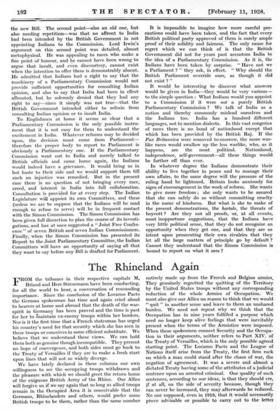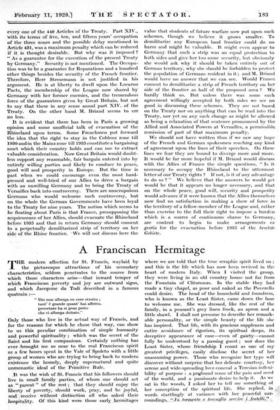The Rhineland Again
FROM the tribunes in their respective capitals M, Briand and Herr Stresemann have been conducting, for all the world to hear, a conversation of resounding importance. Since the conclusion of the Locarno Pacts the German spokesman has time and again cried aloud to hearers at home and abroad that the death of the war- spirit in Germany has been proved and the time is past for her to Maintain ex-enemy troops within her borders. Nor is it the first time that a French statesman has urged his country's need for that security which she has seen in these troops or conceives in some efficient substitute. We believe that we understand these views. We can hold them both as genuine though incompatible. They present no hope of convergence, and both sides must go back to the Treaty of Versailles if they are to make a fresh start upon lines that will not so widely diverge. FROM the tribunes in their respective capitals M, Briand and Herr Stresemann have been conducting, for all the world to hear, a conversation of resounding importance. Since the conclusion of the Locarno Pacts the German spokesman has time and again cried aloud to hearers at home and abroad that the death of the war- spirit in Germany has been proved and the time is past for her to Maintain ex-enemy troops within her borders. Nor is it the first time that a French statesman has urged his country's need for that security which she has seen in these troops or conceives in some efficient substitute. We believe that we understand these views. We can hold them both as genuine though incompatible. They present no hope of convergence, and both sides must go back to the Treaty of Versailles if they are to make a fresh start upon lines that will not so widely diverge.
We have lately declared in these columns our own willingness to see the occupying troops withdrawn and the pleasure with which we should greet the return home of the exiguous British Army of the Rhine. Our Allies will forgive us if we say again that so long as allied troops remain in the Occupied Area it is conceivable that the Germans, Rhinelanders and others, would prefer some British troops to be there, rather than the same number entirely made up from the French and Belgian armies, They genuinely regretted the quitting of the Territory by the United States troops without any corresponding reduction of the whole Armies of Occupation. We must also give our Allies no reason to think that we would " quit " in another sense and leave to them an unshared burden. We need not repeat why we think that the Occupation has in nine years fulfilled a purpose which need no longer keep alive feelings that were inevitably present when the terms of the Armistice were imposed. When these spokesmen connect Security and the Occupa- tion in their arguments, neither refers to Part XIV. of the Treaty of Versailles, which is the only possible agreed starting point. The Locarno Pacts and the- League of Nations itself arise from the Treaty, the first firm rock on which a man Could stand after the chaos of war, the negation of agreement., It was a severe , and almosi a dictated Treaty having some of the attributes of a judicial sentence upon an arrested criminal. One quality of such sentences, according to our ideas, is that they• should err, if at all, on the side of severity because, though they Can never be increased, they may afterwards be reduced. No one supposed, even in 1919, that it would necessarily prove adVisable or possible- to carry out to the letter every one of the 440 Articles of the Treaty. Part XIV., With its terms of five, ten; and fifteen years' occupation of the three zones and the possible delay mentioned in Article 481, was a maximum penalty which can be reduced if it is . thought desirable. But why was it imposed ? " As a guarantee for the execution of the present Treaty by Germany." Security is not mentioned. The Occupa- tion was to be a guarantee for Reparations and a hundred other things besides the security of the French frontier. Therefore, Herr Stresemann is not justified in his argument. He is at liberty to dwell upon the Locarno Pacts, the membership of the League now shared by Germany with her former enemies, and the tremendous force of the guarantees given by Great Britain, but not to say that these in any sense annul part XIV. of the Treaty. On the other hand M. Briand seems to err no less.
It is evident that there has been in Paris a growing opinion and some unofficial talk of evacuation of the Rhineland upon terms. Some Frenchmen put forward the idea that the right to stay in the Coblenz zone till 1930 and in the Mainz zone till 1935 constitute a bargaining asset which their country holds and can use to extract valuable consideration. Now Great Britain would doubt- less support any reasonable, fair bargain entered into by entirely willing parties and likely to conduce to peace, good will and prosperity in Europe. But the time is past when we could encourage even the most hard- pressed and well-tried of our Allies to drive a bargain With an unwilling Germany and to bring the Treaty of Versailles back into controversy. There are unscrupulous Germans who would welcome such controversy, but on the whole the German Governments have been loyal to the Treaty for nine years. The notion which seems to be floating about Paris is that France, presupposing the acquiescence of her Allies, should evacuate the Rhineland before 1935 and that in return Germany should consent to a perpetually demilitarized strip of territory on her side of the Rhine frontier. ' We will not discuss here the value that students of future warfare now put upon such schemes, though we believe it grows smaller. To demilitarize any European land frontier could do no harm and might be valuable. It might even appear_ to Germany that such a strip was an equal protection to both sides and give her too some security, but obviously she would ask why it should be taken entirely out of German territory, why she should be forbidden to protect the population of Germans resident in it ; and M. Briand would have no answer that we can see. Would France consent to demilitarize a strip of French territory on her side of the frontier as half of the proposed area ? We hardly think so. But unless there was some such agreement willingly accepted by both sides we see no good in discussing these schemes. They are not based on the Treaty nor on anything that can be read into the Treaty, nor yet on any such change as might be allowed as being a relaxation of that sentence pronounced by the Allied and Associated Powers at Versailles, a permissible remission of part of that maximum penalty.
We should not have written thus if we saw any hope of the French and German spokesmen reaching any kind of agreement upon the lines of their speeches. On these lines we fear they are bound to diverge more and more. It would be far more hopeful if M. Briand would discuss with the Allies of France the simple questions, " Is it necessary to occupy the Rhineland to the uttermost letter of our Treaty rights ? If not, is it of any advantage to do so ? " We believe that the answers he would get would be that it appears no longer necessary, and that on the whole peace, good will, security and prosperity would advance if it were known that the Allies themselves now find no satisfaction in making a show of force in the territory of a fellow-member of the League and, rather than exercise to the full their right to impose a burden which is a source of continuous shame to Germany, are content to begin to make arrangements ex gratia for the evacuation before 1935 of the besetxte Gebiete.







































 Previous page
Previous page